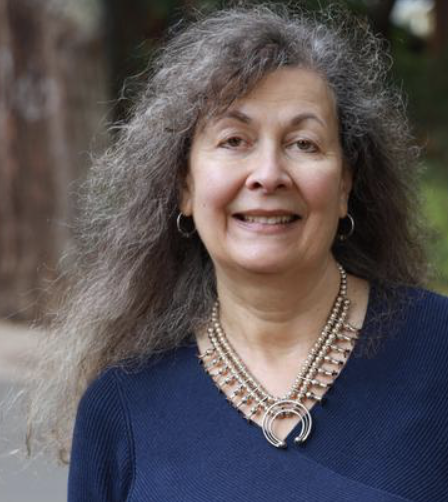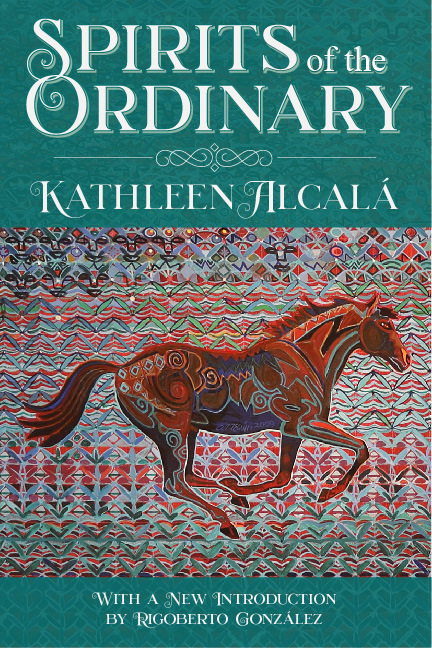
“My three novels address the very different parts of my ancestry. I also hope to have this book in particular picked up by the Jewish reader interested in the Jewish diaspora from Spain, someone who realizes that an Eastern European background is not the only one.”— Kathleen Alcalá
This blog posts on Mondays. Fourth Mondays of the month I devote to a Q & A with a fellow writer.

A couple of decades ago, when I was beginning to publish my own work about Mexico, and editing Tameme, a bilingual English/Spanish journal of new writing from Canada, the US and Mexico, I had the immense fortune to meet some of the most accomplished and innovative literary writers from the US-Mexico borderlands, among them, Kathleen Alcalá. The author of several books of fiction and nonfiction, Alcalá’s work has been recognized with Western States Book Award, the Governor’s Writers Award, and a Pacific Northwest Booksellers Association Book Award. In 2014 she was honored by the national Latino writers group, Con Tinta, and she has been designated an Island Treasure in the Arts on Bainbridge Island, where she lives in the state of Washington. When I first met Alcalá, her novel set in northern Mexico in the 1870s, Spirits of the Ordinary, based on the true history of Mexican Jews practicing their religion in secret, was then relatively recently published, and a sensation it was, for the history of the conversos of northern New Spain (Spanish Jews who had converted to Christianity at the time of the 15th century expulsion of the Jews) and the crypto-Jews (those who practiced Judaism in secret) was then little known. Spirits of the Ordinary received high praise, for example, from Publisher’s Weekly, which called it “A fecund fable about the convergence of cultures—Mexican, American and Jewish—along the Mexico/Texas border…. Alcalá’s seductive writing mixes fatalism and hope, logic and fantasy.” And no less a literary heavyweight than Larry McMurtry called it “continually arresting—a book in which passions both ordinary and extraordinary are made vivid and convincing.”
How delighted I was to learn from Kathleen that, for its 25th anniversary, Spirits of the Ordinary is back in print in a lovely new edition from Raven Chronicles Press, introduced by one of my favorite poets, Rigoberto González. Apropos of that, Alcalá agreed to answer some questions.

C.M. MAYO: What inspired you to write Spirits of the Ordinary?
KATHLEEN ALCALÁ: My first book was a collection of short stories in the manner of the stories told by my mother’s family. When I finished the last, long story I realized that I knew much more about these characters, based on my family’s history, enough for at least one novel. It turned out to be three novels.
C.M. MAYO: As you were writing, did you have in mind an ideal reader?
KATHLEEN ALCALÁ: I don’t know if I should be embarrassed to say that I expected my readers to be much like myself, people who grew up in the United States, but with our cultural roots firmly in Mexico. This comprises some of my audience. But a bigger part of it is the American readership that has good associations with Mexico as a vacation destination and the site of some of their fantasies.
Toni Morrison described this as writing under “the white gaze.” I had no idea how important this was for BIPOC (Black or Indigenous People of Color) writers. I was not writing the “poor farmworker makes good” narrative that was expected of me in the publishing world. As a result, around 25 publishers rejected the novel before Chronicle Books took a chance on it.
C.M. MAYO: Now that some years have gone by, can you describe the ideal reader for this book as you see him or her now?
KATHLEEN ALCALÁ: The ideal reader is now a generation younger than I am. It is a young professional or student who wants to broaden their perspective to include fore parents who loved the land, fought for it, died for it, and were often discriminated against by their own society. My three novels address the very different parts of my ancestry. I also hope to have this book in particular picked up by the Jewish reader interested in the Jewish diaspora from Spain, someone who realizes that an Eastern European background is not the only one.
C.M. MAYO: Can you share any surprises for you about the reception of your book’s first edition? (And has it been different in different countries?) Do you expect it to be different in 2021?
KATHLEEN ALCALÁ: Spirits received a number of awards right out of the chute. From manuscript rejection to publication and great reviews in a year really floored me. I was not prepared for the embrace provided by readers. I have to thank writers like Ursula K. Le Guin and Larry McMurtry, as well as booksellers like Rick Simonsen at Elliott Bay Books and Paul Yamazaki at City Lights for their kind words that helped propel this book out into the world.
C.M. MAYO: What inspired you to bring Spirits of the Ordinary back into print?
KATHLEEN ALCALÁ: Almost twenty-five years later, crypto-Jews are no longer a secret. When I was researching and writing, no one knew what I was talking about except for a few Sephardic Jews. Now there is a substantial body of writing about the events leading to this condition, as well as critical analysis of both the events and the literature. I feel as though this topic has come full circle now that Spain has offered expedited citizenship to descendants of the Expulsion. This provides a much more complete context for my work.
C.M. MAYO: Which writers have been the most important influences for you when you were writing Spirits of the Ordinary— and subsequently?
KATHLEEN ALCALÁ: I have always read science fiction along with mainstream fiction. Some people look down on “genre” fiction as not true literature, but alternate worlds and points of view fit perfectly with my upbringing in the southwest, with cousins on both sides of the border. Our reality has always been alternative.
Other writers will tell you it is comics that sustained them when they were young, but that’s really the same thing, except in pictorial form: narratives willing to address the “what if.”
I studied with Ursula K. Le Guin, Joanna Russ, and Charles Johnson. I read Elena Poniatowska and Juan Rulfo in Spanish, and later my age peers, Ana Castillo, Sandra Cisneros and Denise Chávez, although they were way ahead of me in achievements.
More recent writers who have knocked me dead include Roberto Bolaño, Ruth Ozeki, Sabrina Vourvoulias, Isabel Quintero and NK Jemison. There are so many more. Books are my vice.
C.M. MAYO: Which writers are you reading now?
KATHLEEN ALCALÁ: I’ve read a lot of Greg Bear’s books because we are friends and he is very prolific. Nisi Shawl is an up and coming writer even though she has already received a lot of accolades. I have been reading a lot of indigenous writers recently, mostly poets like Laura Da’, but also fiction and essayists like Rebecca Roanhorse and Elissa Washuta. Every time I meet a new writer whose work I like, I try to let them know how great their writing is. I probably scare people at conferences because I am not cool— I am enthusiastic, especially with writers of color or those who otherwise don’t fit into the mainstream narrative.
This is one reason that, Phoebe Bosché, Philip Red-Eagle and I started Raven Chronicles Press. We wanted to provide a showcase for these wonderful writers. Currently, you can see much of this work in an anthology called Take a Stand: Art Against Hate. I am also working with Professor Norma Elia Cantú on an anthology of stories, essays and poetry about La Llorona— again, because there is so much talent, so many ideas that need to be published and shared.
C.M. MAYO: How has the Digital Revolution affected your writing? Specifically, has it become more challenging to stay focused with the siren calls of email, texting, blogs, online newspapers and magazines, social media, and such? If so, do you have some tips and tricks you might be able to share?
KATHLEEN ALCALÁ: All of this is terrible. I am so easily distracted. I will start laundry, open a file, take notes by hand, and forget what I had planned to do that day. For me, the best strategy is still the writing residency, away from home, where I don’t have any excuses and fewer distractions. This is especially needed when I am trying to organize large blocks of writing, such as the chapters in a novel.
C.M. MAYO: For those looking to publish, what would be your most hard-earned piece of advice?
KATHLEEN ALCALÁ: Before submitting anything, research the market. If looking to publish in a magazine, purchase half a dozen or so that seem to be likely venues for your work. Look at them carefully and see if you fit in. This is a good place to start, rather than submitting book length manuscripts to publishers, because book editors read these magazines, too. It also gives you a chance to learn how to work with an editor, to receive suggestions and shape the best possible piece for the magazine.
C.M. MAYO: What’s next for you as a writer?
KATHLEEN ALCALÁ: Surprisingly, after all these years, Spirits of the Ordinary and Treasures in Heaven (my third novel, which is about the feminist movement in Mexico) have been optioned for movie and television rights! We will see where that goes. In between distractions, I am foolishly working on two novels at the same time – one is set in 10th Century Spain, and one in a near-future west coast and Mexico. Oh yes, and I owe someone a short story!
> Visit Kathleen Alcalá at www.kathleenalcala.com
I welcome your courteous comments which, should you feel so moved, you can email to me by simply clicking here.

Q & A with Jan Cleere on Military Wives in Arizona Territory:
A History of Women Who Shaped the Frontier
Why Translate? The Case of the President of Mexico’s Secret Book
In Memorium:
William C. Gruben and his “Animals in the Arts in Texas”
Find out more about
C.M. Mayo’s books, articles, podcasts, and more.

